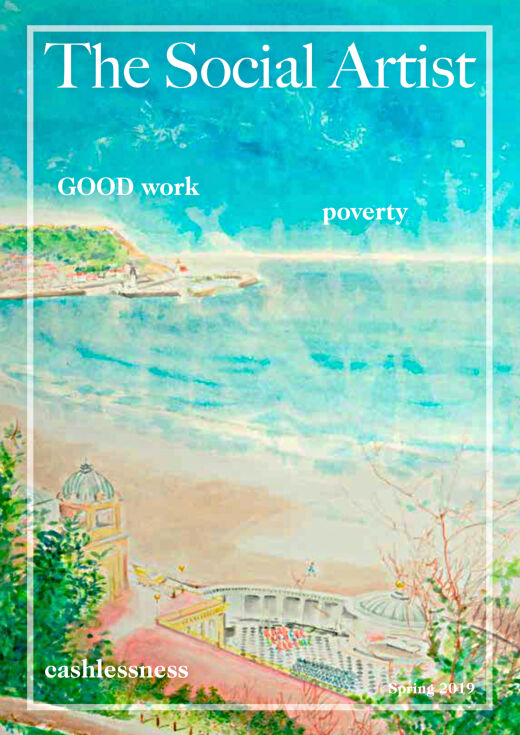The Spring 2019 edition explores the need for financial independence and the threat of cashlessness.
Editor: Dr Frances Hutchinson
The Social Artist has been an important publication for gathering together writers, past and present, who are thinking deeply about society, economy and the meaning of human existence. The Spring 2019 edition is a typically thought-provoking exploration of the ideal of Financial Independence and the threat of cashlessness, with the following chapters:
From the Editorial:
“Don’t let money wreck the world.” The curious words on my lapel badge elicit a thoughtful but puzzled reaction. How can we prevent the world financial system from riding juggernaut-fashion across the remaining natural habitats, destroying
the fertility of the soils, bringing war and social injustice whilst destabilising the climate conditions necessary to sustain all life forms on planet earth?
Big Brother, (that is, the power of finance that lies behind the political, economic and cultural spheres of the human social order), hasn’t the slightest intention of pulling back from his power-games. On the contrary, the powers-that-be are paving the road to the complete powerlessness of the individual by bringing in the cashless society (see Norbert Haering article in this issue). As is becoming increasingly clear, change must come from the grass roots, from our households. Quietly, almost imperceptibly, powerful change is already seeping into the system. The trend is increasingly towards Financial Independence (FI) in some form or other. By applying strict accounting methods to the domestic budget, in terms of both income and expenditure, it becomes possible for any household in the world to work free of waged and salaried slavery. To be Financially Independent is to be in a position where you can say:
“I don’t have to work at a 9-5 job: I don’t have an employer that I rely on for a pay cheque. I have reached Financial Independence, and that’s a beautiful thing!”
Having no need to work for money does not prevent one from working. The real beauty of FI is that one can work at those things one considers worthwhile, running a small business, working for either for less money, or on a voluntary basis, at necessary and intrinsically satisfying tasks.
A pipe dream? Well, not really. It’s old hat. The quest of the financial system is to tie all individuals into waged and salaried slavery, on threat of being dependent upon Food Banks (see Bernadette Meaden in this issue). The last thing the financial powers-that-be want to see is every body having a small but independent income without having to work full time over a lifetime to reach the increasingly ephemeral carrot of a pension and a paid-off mortgage. The route to Financial Independence has been most comprehensively described by Vicki Robin and Joe Dominguez in their book Your Money or Your Life: 9 Steps to Transforming Your Relationship With Money and Transforming Your Life. First published in 1992, the book remains a best-seller and a most useful guide to the perplexed.
In the meantime, the subject has been quietly pursued by individuals from many different and varied circumstances who have used their own expertise to chart routes to their own version of FI. This raises the question of wealth. What is wealth? How is it acquired? Devised from the work of John Ruskin, the comic book Bloke’s Progress provides excellent discussion material on the subject of money, life, wealth and work (see review). The Douglas Social Credit analysis of the financial system descends directly from the work of John Ruskin, through William Morris, the Guild Socialists and the Arts and Crafts movement (see Hutchinson and Burkitt, The Political Economy of Social Credit and Guild Socialism). In the immediate aftermath of the First World War Clifford Hugh Douglas, founder of the world- wide Social Credit movement, asked the searching and fundamental questions – how is it that emulative consumerism and over- production for war is rewarded as wealth- creating, whilst care of the land, education and health promotion cannot be afforded? For women in the Social Credit movement, the quest was not for all to neglect the children, the household and the local community by becoming slaves to the machines. As biographies of so many lives reveal, women have always been particularly successful in shaping their relationships with money in order to be free to craft, care and create across the spectrum of the arts and sciences.
Close observation of the real-world economy that lies outside the economics textbooks reveals that many have successfully fought free from the straitjacket of full-time paid employment. The quest is to be free to undertake satisfying, honourable, self-determined work. Such work, undertaken for the common good of the local community, has always been a goal in life for many individuals. And women have been particularly good at managing households through their control over the domestic purse, that is, through juggling caches of cash. Earnings from occasional employment and the management of small businesses, with or without the earnings of a main ‘breadwinner’, have enabled women across the world to cooperate in the creation of viable communities. Today’s moves to remove cash will force women (and men) across the world further into the long hours of employment necessary to maintain the unsustainable Machine as it careers out of control. The task is to work with others in one’s own locality, to secure financial independence not only for one’s household, but, more importantly, for one’s own local municipality. That is for another time. In the meantime, “Don’t let cashlessness wreck the world.”
Read and download the free pdf of this edition in your browser, link below.

The publisher is Social Credit Secretariat. The Social Artist Spring 2019 © Social Credit Secretariat 2019.
Basic Income, nature & economics, social justice, tax and benefits, Women-Centred, England, Paper